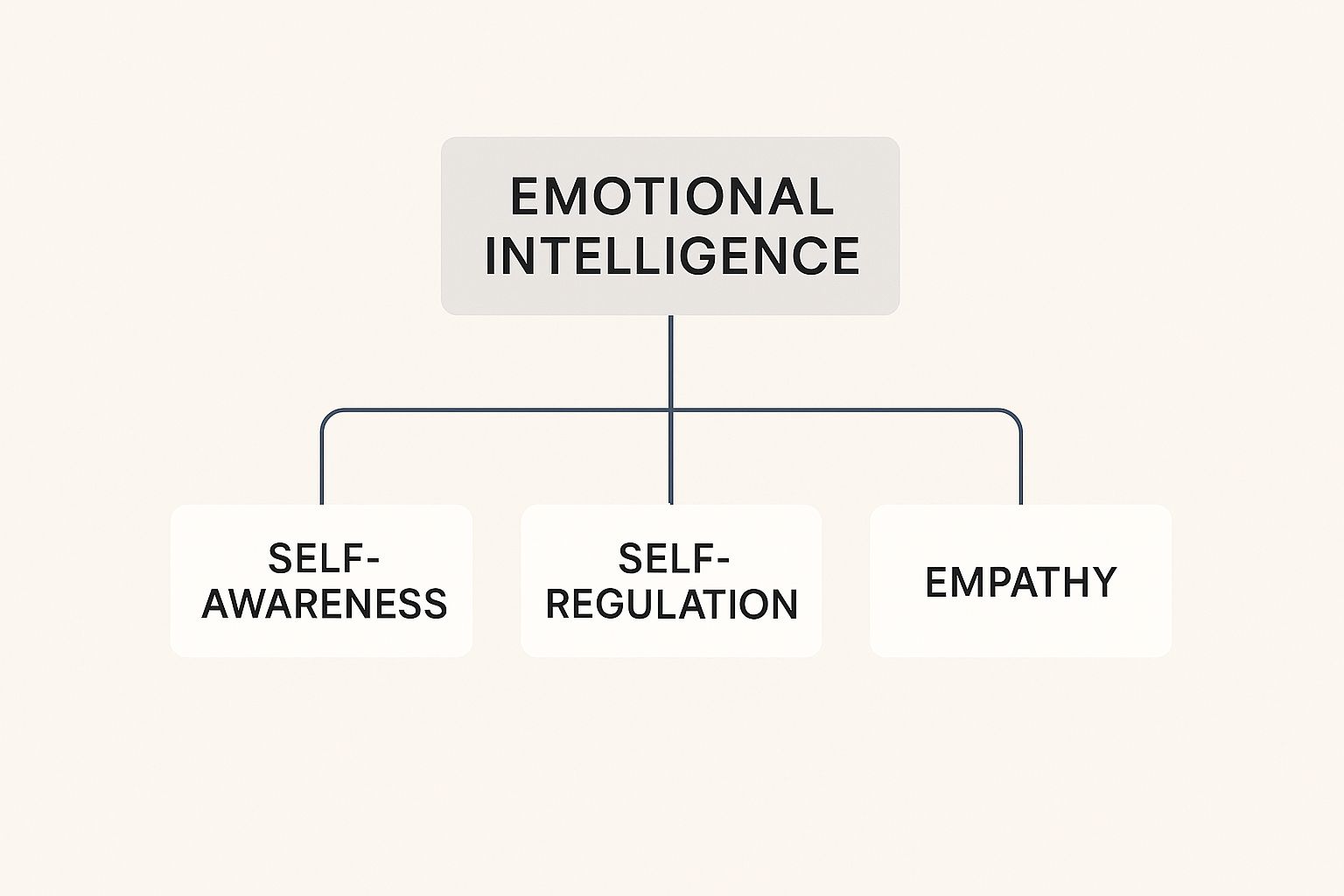Building resilience at work means developing your ability to manage pressure, bounce back from setbacks, and navigate challenges calmly. It’s a skill that helps you handle difficult situations, like a tough project or critical feedback, without feeling overwhelmed. This ability is key to preventing burnout and creating a sustainable, positive career path.
Why Workplace Resilience Is Your New Superpower

Feeling overwhelmed at work is a common experience, with deadlines, team dynamics, and heavy workloads often leading to stress and anxiety. This is why resilience has become more than just a buzzword; it's an essential skill for protecting your well-being. Building this skill helps you stay grounded and maintain your mental health.
Resilience isn’t about ignoring problems or simply pushing through pain; it’s about responding to challenges with thoughtfulness and compassion. By developing mental and emotional stamina, you can face professional hurdles constructively. A resilient mindset helps you keep perspective during tough times and find a positive way forward.
The Urgent Need for Resilience in India
The conversation around mental health in the Indian workplace is growing, and for good reason. Recent data shows a workforce facing significant strain. According to the Happiest Places to Work® 2025 report, a staggering 66% of India’s workforce feels unhappy at work, with 54% considering quitting.
These figures reflect a widespread need for both individuals and organisations to prioritise employee well-being. It’s about creating a professional life that feels sustainable in the long run. Discover more insights from the workforce happiness report.
When you consciously build your resilience, you develop tools to manage your emotional responses. This helps prevent the kind of prolonged workplace stress that can contribute to deeper issues like anxiety and depression.
Resilience gives you the capacity to not only survive but also thrive amidst professional pressures. It’s the difference between feeling drained by your work and feeling engaged by its challenges.
What Does Building Resilience Actually Involve?
So, how do you learn to build resilience? It involves consistent practices that support your overall mental health and strengthen your ability to cope over time.
Think of it like building a muscle—it requires regular effort. Some core practices include:
- Developing Self-Awareness: Understand your personal stress triggers and emotional patterns. Notice when and why you feel most overwhelmed.
- Practising Self-Compassion: Treat yourself with kindness, especially when facing setbacks. Your inner critic can often be your biggest challenge.
- Setting Healthy Boundaries: Protect your time and energy to prevent burnout. This means learning to say no and disconnecting when you need to.
- Seeking Support: Recognise that you don't have to handle everything alone. Know when to reach out to a manager, a colleague, or through professional therapy or counselling.
Ultimately, fostering resilience is about proactively managing your career while making your well-being a priority.
Pinpoint Your Personal Stress Triggers at Work
Before you can build resilience, it’s helpful to understand what wears it down. This starts with self-awareness. You can’t address workplace stress until you identify its specific sources in your own life.
Your goal is to become an observer of your work life. What situations, tasks, or interactions consistently leave you feeling drained or anxious? These triggers are unique to you; for one person, it might be constant notifications, while for another, it could be public speaking.
Often, it’s not a single big event that leads to burnout. It's the accumulation of small, everyday pressures that can take a toll.
From Vague Feelings to Clear Triggers
A simple and effective way to identify your triggers is through journaling. Just take five minutes at the end of each day to note any moments you felt particularly stressed or frustrated.
Ask yourself: What was I doing? Who was I with? What thoughts were going through my mind? Being specific helps; instead of "felt stressed," try "felt tense when I received a vague email from my manager at 4 PM."
After a week or two, you may start to see patterns. This exercise can turn a general feeling of stress into a concrete list of challenges you can begin to address.
Sorting Your Stressors: What You Can and Cannot Control
Once you have a list of triggers, the next step is to categorise them. This helps you focus your energy where it will make the most difference. We can sort them into two simple groups.
- Controllable Stressors: These are things you have direct influence over, such as your habits, responses, and daily management. Examples include preparing for a presentation or turning off email notifications for an hour.
- Uncontrollable Stressors: These are external factors you can’t change, like a company-wide reorganisation, a client’s personality, or economic conditions.
Trying to control the uncontrollable is a path to exhaustion. Real resilience comes from focusing on what you can influence: your own actions and reactions.
To put this into practice, you can map out your stressors and plan your first action. This framework turns your list into a practical plan.
Identifying and Categorizing Your Workplace Stressors
| Stressor Example | Category (Controllable/Uncontrollable) | Potential First Action |
|---|---|---|
| A colleague consistently misses deadlines, impacting my work. | Uncontrollable (their behaviour) | Controllable: Schedule a brief, direct conversation to set clear expectations for handoffs. |
| Feeling unprepared for a major client presentation. | Controllable | Schedule two 30-minute practice sessions in my calendar for next week. |
| The company announced a hiring freeze, increasing my workload. | Uncontrollable (company policy) | Controllable: Block out time to speak with my manager about prioritising my current projects. |
| My inbox is overflowing with non-urgent emails. | Controllable | Dedicate the first 15 minutes of my day to sorting and archiving emails, then close the tab. |
This sorting process can be very empowering. It helps you stop wasting energy on things you can't change and focus on areas where you can make a real difference.
Rewire Your Thinking with a Resilient Mindset

True resilience isn’t just about enduring pressure; it's about how you frame challenges in your mind. The stories we tell ourselves after a setback shape how we bounce back. Your mindset is the foundation of your well-being and influences how you navigate work’s ups and downs.
Learning to reframe your thoughts is a powerful skill. It’s the difference between seeing a failed project as a disaster and viewing it as a learning opportunity. Small, conscious shifts in thinking can change how you experience challenges, making you more adaptable and less prone to anxiety.
Adopt a Growth Mindset
A growth mindset is the belief that your abilities can be developed through dedication and effort. When you adopt this perspective, challenges become opportunities to improve rather than threats. This is fundamental to building resilience at work.
For example, if you receive harsh feedback on a report, a fixed mindset might think, "I'm not good at this." A growth mindset would respond, "This is useful. What can I do to make the next one stronger?" This small shift moves you from self-blame to positive action, which is key to managing workplace stress.
Here’s how to start cultivating it:
- Embrace imperfections. Everyone makes mistakes. Accepting them as part of the learning process reduces the fear of failure.
- Focus on the process. Celebrate the effort and strategies you use, not just the final outcome.
- Seek out challenges. Step out of your comfort zone to prove to yourself that you can learn, adapt, and grow.
Practice Self-Compassion
We are often our own harshest critics, especially under pressure. Self-compassion means treating yourself with the same kindness you would offer a friend in a similar situation. It acts as a buffer against negative self-talk that can lead to anxiety or even depression.
When you make a mistake, your inner critic may become loud. Self-compassion involves pausing to acknowledge the difficulty of the situation without judging yourself. It provides the emotional support needed to learn from the experience and move forward constructively.
Self-compassion is permission to be human. It’s a reminder that messing up is a shared experience, not a personal failing, which makes it infinitely easier to get back up and try again.
Turn Negative Thoughts into Neutral Observations
Our brains have a natural bias toward negativity, which can be unhelpful in the modern workplace. You can learn to question these automatic negative thoughts. This process, often explored in therapy and counselling, helps you identify and reframe unhelpful patterns.
A helpful tool for this is a cognitive behavioral thought record. It guides you to examine the evidence for and against your automatic thoughts, helping you find a more balanced perspective. Please remember, tools like these are for informational purposes, not for diagnosis.
The goal isn't forced positivity, but balanced thinking. If a thought like, "My boss thinks I'm incompetent" arises, challenge it by asking, "What evidence supports this?" This shift is key to regulating emotions and building mental resilience.
Protect Your Energy and Prevent Burnout

True resilience is about protecting your energy, not just pushing through exhaustion. Preventing burnout is a smart, proactive strategy for maintaining both your mental health and your performance. It begins with setting a clear boundary between your work and personal life.
With remote and hybrid work blurring these lines, learning to switch off has become essential. This means defining when your workday ends and protecting your personal time.
Establish Your Non-Negotiables
To protect your energy, you must first identify what restores it. These are your "non-negotiables"—activities so crucial for your well-being that they are like appointments with yourself.
Your non-negotiables might include a daily walk, a "no work talk" rule at dinner, or time for a hobby. These aren't luxuries; they are daily practices that prevent the slow build-up of workplace stress.
- What are your top 3 non-negotiables? Identify the activities that genuinely recharge you.
- Block them in your calendar. Treat them as seriously as a client meeting.
- Communicate your boundaries. Setting your status to "offline" after hours sends a clear signal to your team.
Master the Art of Restorative Breaks
Not all breaks are equally effective. Mindlessly scrolling through social media can leave you feeling more drained. A restorative break is an intentional pause designed to disconnect and recharge.
Instead of eating at your desk, step away from the screen. A short walk, listening to music, or simply enjoying a meal without distractions can make a world of difference in managing anxiety and improving focus. You can find more insights on breaking free from toxic productivity.
Burnout isn't a sign you've failed. It's a signal that your approach to work and rest simply isn't sustainable. Proactive rest is the antidote that allows you to show up as your best self, day after day.
The Indian Context of Workplace Burnout
In India, the pressures of work can be amplified by various socio-economic stresses, creating a unique environment where mental fatigue is common. Any discussion about resilience here should also address the root causes of burnout within the work culture.
Creating a supportive mental wellness ecosystem is key. This involves more than individual coping skills; it requires empathetic leadership and safe environments where people feel comfortable discussing their struggles.
Protecting your energy comes down to a simple truth: your well-being is the foundation of your professional success. By setting boundaries and taking restorative breaks, you can build a career that is both successful and sustainable.
Build Your Support System for Lasting Well-Being

Building resilience is not a solo journey. While your mindset and boundaries are crucial, lasting well-being is often supported by the people around you.
Having a solid support system is a proactive strategy for managing workplace stress. This network can include trusted colleagues, a supportive manager, or professionals who offer a safe space to discuss challenges.
Fostering Connections Within the Workplace
Positive relationships at work can create a psychological safety net that makes difficult days more manageable. This involves learning to communicate your needs constructively.
For example, if your workload is overwhelming, approaching your manager can be a collaborative effort. Frame the conversation around shared goals, like maintaining quality work without risking burnout. Similarly, building genuine friendships with peers provides allies who understand your daily experiences.
A strong support network at work isn’t just about having people to vent to. It’s about creating an environment where putting your hand up and asking for help is seen as a sign of strength, not a weakness.
Normalising Professional Support
Sometimes, workplace challenges require a more structured and confidential setting. This is where professional support, like therapy and counselling, can be an invaluable tool for building resilience.
Seeking professional help is a proactive step toward personal growth. In India, as conversations around mental health become more open, it helps to see therapy as mental fitness training—a space to build coping skills for challenges like anxiety or feelings of depression that can arise from work pressure.
Taking the First Step with Confidence
Deciding to seek professional help is a powerful commitment to your well-being. Platforms like DeTalks offer resources to find a therapist and provide assessments that can offer initial insights into your mental state.
It's important to remember that these assessments are informational tools to help guide you, not diagnostic instruments.
Engaging with a professional is an investment in your long-term happiness and career. It offers a confidential space to process stress and develop skills to not just survive, but thrive.
Your Resilience Toolkit for The Road Ahead
Building resilience is an ongoing practice, not a final destination. It's a journey of weaving together self-awareness, mindful thinking, and strong support systems. Every small step builds your capacity to handle the realities of modern work.
This is about progress, not perfection. You will still have tough days. The goal isn’t to become immune to workplace stress, but to build the confidence that you can manage it effectively.
Supportive Takeaways You Can Use Today
Lasting change comes from small, consistent actions integrated into your routine. Instead of attempting a complete overhaul, focus on one or two simple practices to make building resilience feel achievable.
Here are a few things you can start doing right now:
- Try a 5-Minute Mindful Check-in. Pause once a day to ask, "What am I feeling, and what do I need?" This simple habit enhances self-awareness.
- Identify One Small Boundary. What is one clear line you can draw today? It could be logging off at a set time or taking a full lunch break away from your screen.
- Acknowledge One Small Win. Before you end your day, take a moment to recognise something you handled well. This act of self-compassion helps counter our brain's natural negativity bias.
These practices are vital, especially given the state of workforce health in India. A recent analysis found that 33.9% of professionals report high stress levels. Interestingly, remote workers reported higher stress levels (57%) than their in-office counterparts. You can discover more insights from this workforce health analysis.
Knowing When to Seek Professional Guidance
Remember, you don't have to navigate these challenges alone. It's completely normal to feel overwhelmed at times. Seeking professional therapy or counselling is a proactive step toward strengthening your mental fitness.
Reaching out for support is not a sign that you are failing; it is a sign that you are committed to your own well-being. A therapist provides a safe space and expert tools to help you navigate issues like anxiety, depression, and burnout.
Think of professional services as a key part of your resilience toolkit. They offer a structured environment to develop tailored coping strategies and build lasting mental fortitude. This is a direct investment in your personal happiness and long-term career success.
At DeTalks, we believe that everyone deserves access to the right support for their mental well-being. Our platform connects you with qualified therapists and provides science-backed assessments to help you understand your needs and build a more resilient, fulfilling life. Start your journey with us at https://detalks.com.




